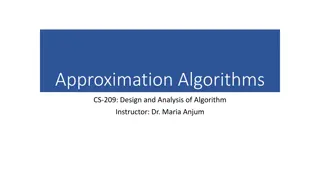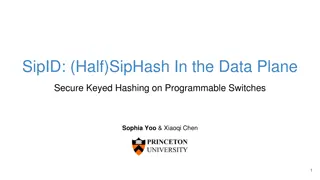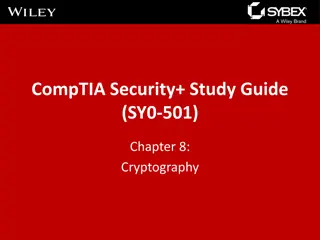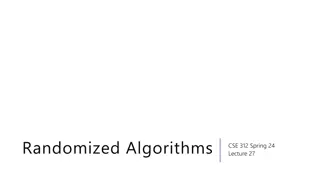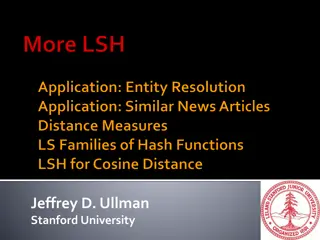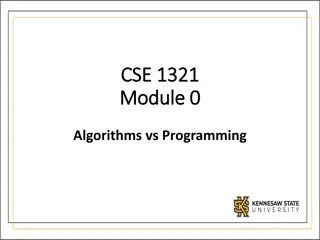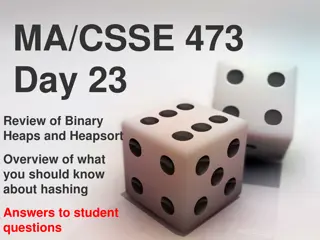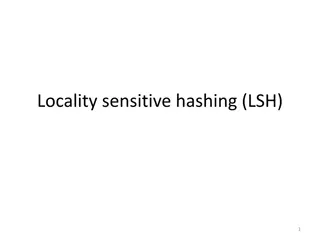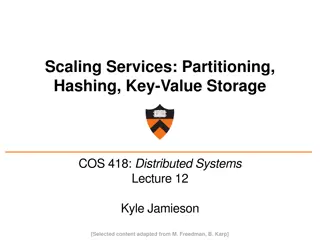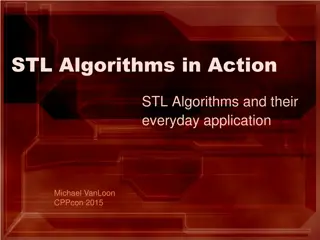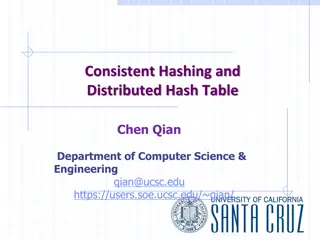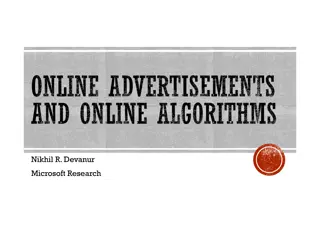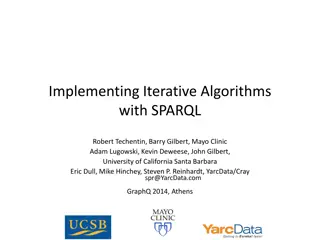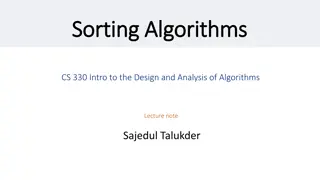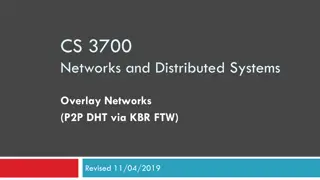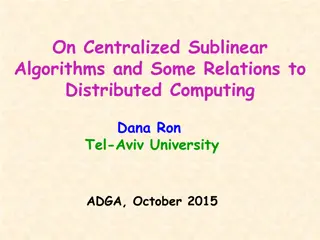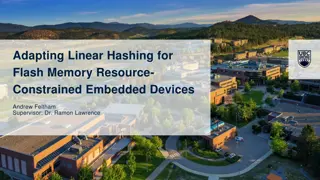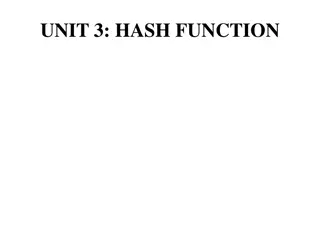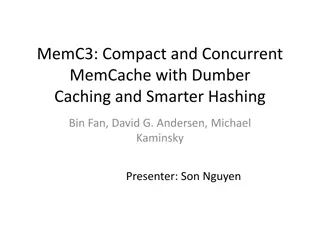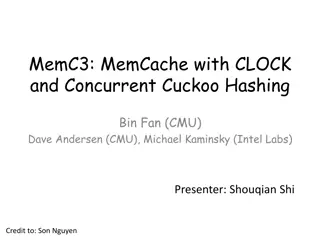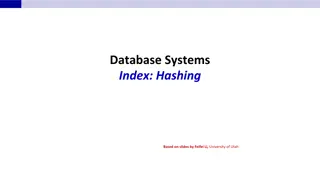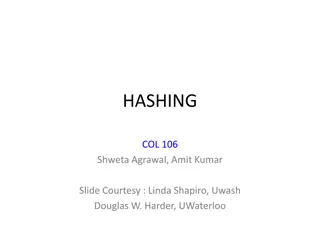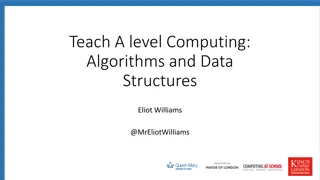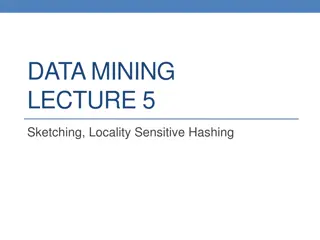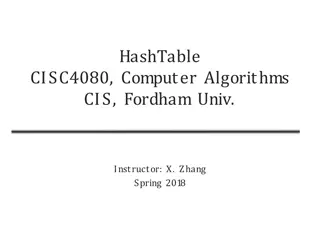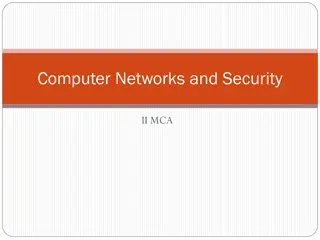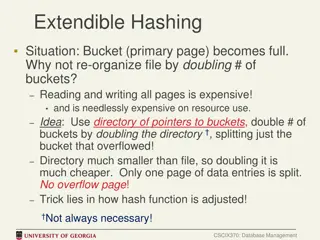Understanding Algorithms and Programming Fundamentals
Learn about algorithms, programming, and abstraction in computing. Explore the definition and properties of algorithms, the relationship between algorithms and programming, and the concept of abstraction. Discover how algorithms are like recipes and how abstraction simplifies complex tasks in comput
1 views • 17 slides
Near-Optimal Quantum Algorithms for String Problems - Summary and Insights
Near-Optimal Quantum Algorithms for String Problems by Ce Jin and Shyan Akmal presents groundbreaking research on string problem solutions using quantum algorithms. The study delves into various key topics such as Combinatorial Pattern Matching, Basic String Problems, Quantum Black-box Model, and mo
0 views • 25 slides
Understanding Approximation Algorithms: Types, Terminology, and Performance Ratios
Approximation algorithms aim to find near-optimal solutions for optimization problems, with the performance ratio indicating how close the algorithm's solution is to the optimal solution. The terminology used in approximation algorithms includes P (optimization problem), C (approximation algorithm),
2 views • 10 slides
Secure Keyed Hashing on Programmable Switches
Explore the implementation challenges and opportunities for improved security, privacy, performance, and reliability in data plane applications using (Half)SipHash and CRC32 hashing techniques. Discover the vulnerabilities associated with CRC32 and the need for secure hashing solutions like SipID. L
0 views • 17 slides
Overview of Cryptography Techniques and Algorithms
Exploring the diverse realm of cryptography, this chapter delves into both nonmathematical and mathematical encryption methods. It covers substitution and transposition ciphers, steganography, hybrid systems, hashing, symmetric algorithms like DES and AES, as well as asymmetric algorithms utilizing
7 views • 21 slides
Combining Graph Algorithms with Data Structures and Algorithms in CSE 373 by Kasey Champion
In this lecture, Kasey Champion covers a wide range of topics including graph algorithms, data structures, coding projects, and important midterm topics for CSE 373. The lecture emphasizes understanding ADTs, data structures, asymptotic analysis, sorting algorithms, memory management, P vs. NP, heap
0 views • 38 slides
Understanding Randomized Algorithms: A Deep Dive into Las Vegas and Monte Carlo Algorithms
Randomized algorithms incorporate randomness into computations, with Las Vegas algorithms always providing the correct answer but varying in time, while Monte Carlo algorithms occasionally give wrong answers. Quick Sort is a classic Las Vegas algorithm that involves pivoting elements for sorting. Ch
4 views • 21 slides
Understanding Security Goals and Cryptographic Algorithms
Introduction to security goals such as privacy, data integrity, authentication, authorization, and availability, along with the usage of cryptographic algorithms like symmetric and asymmetric key algorithms, keyed hashing, and digital signatures for achieving different security objectives in communi
0 views • 13 slides
Understanding Scrypt: Maximally Memory-Hard Functions
Scrypt is a memory-hard function designed for password hashing and key derivation, aiming to thwart brute-force attacks by making evaluation moderately hard. It emphasizes the need for memory intensity over computation, hindering the advantages of special-purpose hardware, parallelism, and amortizat
0 views • 59 slides
Entity Resolution Problem in Customer Data Matching
The challenge of entity resolution, especially in the context of matching customer data between companies, is addressed in this content. The scenario involves accurately identifying which records correspond to the same individuals despite potential variations or errors in the data. Strategies such a
1 views • 56 slides
Understanding Algorithms and Programming: A Visual Introduction
Explore the fundamental concepts of algorithms and programming through visual representations and practical examples. Learn about algorithmic thinking, abstraction, recipe-like algorithms, and the importance of logical steps in accomplishing tasks. Discover how algorithms encapsulate data and instru
1 views • 17 slides
Distributed Algorithms for Leader Election in Anonymous Systems
Distributed algorithms play a crucial role in leader election within anonymous systems where nodes lack unique identifiers. The content discusses the challenges and impossibility results of deterministic leader election in such systems. It explains synchronous and asynchronous distributed algorithms
2 views • 11 slides
Comprehensive Overview of Binary Heaps, Heapsort, and Hashing
In this detailed review, you will gain a thorough understanding of binary heaps, including insertion and removal operations, heap utility functions, heapsort, and the efficient Horner's Rule for polynomial evaluation. The content also covers the representation of binary heaps, building initial heaps
0 views • 24 slides
Mathematical Analysis of Algorithms in CMPE371 - Fall 2023-2024
Explore the mathematical analysis of algorithms in CMPE371 for Fall 2023-2024, focusing on non-recursive and recursive algorithms. Learn how to analyze non-recursive algorithms by deciding on input size parameters, identifying basic operations, and simplifying summations. Dive into recursive algorit
1 views • 31 slides
CSE 373 - Hashing Concepts and Exam Preparation
Introduction to hashing in CSE 373, covering basic concepts, hash functions, collision resolution, and runtimes. Exam details for Friday's practice exam include topics on Stacks, Queues, BigO Notation, Heaps, Trees, Design Tradeoffs, and exam format with emphasis on theoretical understanding. Lectur
0 views • 38 slides
Pseudodeterministic Algorithms and Their Application in Search Problems
Pseudodeterministic algorithms provide a unique approach to the search problem associated with binary relations, offering an error reduction technique while sacrificing the ability to approximate the average value of a function. By introducing m-pseudodeterministic and pseudo-pseudodeterministic alg
1 views • 6 slides
Understanding Locality Sensitive Hashing (LSH) for Nearest Neighbor Queries
Locality Sensitive Hashing (LSH) is a technique used to efficiently find nearest neighbors in high-dimensional spaces. By grouping similar points into the same hash bucket, LSH enables fast search for nearest neighbors, overcoming the curse of dimensionality. Variants include k-nearest neighbors and
0 views • 41 slides
Scaling Services and Key-Value Storage Techniques
This content delves into various aspects of scaling services, including partitioning, hashing, and key-value storage. It discusses vertical and horizontal scalability, the chaotic nature of horizontal scaling, techniques for partitioning data, and case studies like Amazon Dynamo. The importance of p
0 views • 48 slides
Understanding STL Algorithms: A Practical Guide
Explore the world of STL algorithms through an insightful discussion on the definition of algorithms, the advantages of using STL algorithms over raw loops, and the different classes of STL algorithms available. Discover how these pre-built libraries can enhance your programming efficiency and code
1 views • 99 slides
Exploring the Role of Algorithms in Game Design
Delve into the world of algorithms in game design, from understanding the fundamental concept of algorithms to their pervasive presence in various aspects of gaming, such as military simulations, medical simulations, and gameplay mechanics. Explore how algorithms shape experiences in different types
0 views • 10 slides
Evolutionary Computation and Genetic Algorithms Overview
Explore the world of evolutionary computation and genetic algorithms through a presentation outlining the concepts of genetic algorithms, parallel genetic algorithms, genetic programming, evolution strategies, classifier systems, and evolution programming. Delve into scenarios in the forest where gi
0 views • 51 slides
Understanding Consistent Hashing and Distributed Hash Table
Explore the concept of consistent hashing and distributed hash tables to efficiently store and retrieve web pages across multiple servers. Learn how hashing functions and algorithms can distribute data evenly, handle server additions smoothly, and minimize object relocations. Discover the benefits o
0 views • 36 slides
Online Advertising and Algorithms: Insights and Simplifications
Explore the world of online advertisements and algorithms through insightful discussions on online advertising, modern developments in online algorithms, and practical optimization strategies like budgeted allocation. Delve into topics such as decision-making under uncertainty, accessing algorithms,
1 views • 22 slides
Implementing Iterative Algorithms with SPARQL
This comprehensive guide explores the implementation of iterative algorithms with SPARQL, focusing on YarcData/Cray's approach to using these algorithms. It covers YarcData's interest in graphs, the Urika appliance, iterative algorithms in machine learning, implementation approach, and algorithms im
1 views • 12 slides
Overview of Sorting Algorithms and Quadratic Sorting - CS 330 Lecture Notes
Sorting algorithms play a crucial role in computer science and computing tasks, consuming a significant portion of computing power. Various algorithms such as Bubble Sort, Selection Sort, and Insertion Sort are discussed for sorting a list of values efficiently. Quadratic sorting algorithms like Sel
0 views • 30 slides
Overlay Networks and Consistent Hashing in Distributed Systems
Understanding the concept of overlay networks and consistent hashing in distributed systems is crucial for scalability and efficient data storage. Overlay networks like P2P DHT via KBR offer a decentralized approach for managing data while consistent hashing provides a balanced and deterministic way
0 views • 36 slides
Understanding Sublinear Algorithms and Graph Parameters in Centralized and Distributed Computing
Centralized sublinear algorithms and their relation to distributed computing are explored, emphasizing the efficiency of algorithms in processing large inputs in sublinear time. Examples of sublinear algorithms for various objects are provided, along with the computation and approximation of graph p
1 views • 34 slides
Adapting Linear Hashing for Flash Memory Constrained Embedded Devices
This research explores the adaptation of linear hashing for improved data handling on flash memory-constrained embedded devices. Motivated by the increasing data collection by IoT devices, the study focuses on implementing database structures like a linear hash table for efficient data processing. T
0 views • 67 slides
Understanding Hash Functions in Data Structures
Hash functions are crucial in storing data efficiently by converting a sized amount of data into a single integer. They are used to generate hash values, hash codes, or hash sums, which serve as indexes in arrays. The hash function should be quick to compute and distribute hash addresses uniformly t
0 views • 200 slides
Enhancing MemC3: Compact and Concurrent MemCache for Improved Performance
MemC3 introduces a novel approach to compact and concurrent caching through dumber caching and smarter hashing techniques, addressing key issues faced by traditional memory caching systems. By implementing CLOCK-based LRU, approximate LRU, and utilizing Cuckoo Hashing, MemC3 achieves significant imp
0 views • 20 slides
Enhancing Key-Value Storage with MemC3 and Cuckoo Hashing
MemC3 is a specialized key-value store that combines CLOCK and Concurrent Cuckoo Hashing to improve performance and efficiency. Memcached, an established DRAM-based key-value store, is also discussed along with its LRU eviction strategy. The use of internal chaining hashtable and LRU caching in Memc
1 views • 23 slides
Cryptographic Algorithms and Hash Collisions Overview
Explore the world of cryptographic algorithms and hash collisions. Learn about various hashing algorithms like MD5, SHA-1, SHA-256, and more. Dive into the concepts of symmetric and asymmetric key algorithms and understand the risks associated with hash collisions. Discover the implications of post-
0 views • 58 slides
Understanding Database Index Hashing Techniques
Hashing-based indexing in database systems is efficient for equality selections but not suitable for range searches. Both static and dynamic hashing methods exist, with static hashing involving fixed primary pages that are allocated sequentially. The process involves determining the bucket to which
0 views • 41 slides
Understanding Data Structures and Hashing in Java
Data structures play a crucial role in organizing, iterating, adding, deleting, and searching data efficiently. Hash tables, linked lists, trees, and more are explored in this overview, highlighting their strengths and trade-offs. Hashing, collision resolution strategies, and the importance of a wel
0 views • 19 slides
Understanding Hashing: Efficient Data Storage and Retrieval
Hashing is a powerful technique for achieving constant time complexity in finding and inserting data. It allows for quick access without the need for ordered elements. Direct addressing, limited hash operations, and efficient storage methods are discussed in this content to optimize data retrieval s
0 views • 100 slides
Understanding Algorithms, Data Structures, and Programming in Computing
Explore the fundamentals of algorithms and data structures in computing, including representations of data structures, recursive algorithms, searching and sorting techniques, hashing, dictionaries, graphs, trees, and more. Dive into the complexities of data types, abstract vs. built-in types, simple
0 views • 53 slides
Understanding Sketching and Locality Sensitive Hashing in Data Mining
Explore the concepts of Jaccard Similarity and Cosine Similarity in data mining, along with their applications in recommendation systems and finding near-duplicates. Discover how Sketching and Locality Sensitive Hashing techniques help in efficiently identifying similar items and solving the Nearest
0 views • 63 slides
Understanding Hash Tables and Hashing Concepts in Computer Algorithms
This content delves into the concept of Hash Tables, covering topics such as the support for dictionary operations, achieving constant time through direct address tables, case studies in web server maintenance, and an exploration of hashing functions and collision avoidance. It also touches upon key
0 views • 40 slides
Understanding Network Security Principles and Techniques
Explore the fundamental concepts of network security, including issues of confidentiality, integrity, and non-repudiability. Learn about the challenges of securing networks and the types of attacks that computer systems face. Dive into basic security techniques like hashing and symmetric key cryptog
0 views • 36 slides
Efficient Bucket Management in Extendible Hashing
In cases where a bucket (primary page) becomes full in extendible hashing, re-organizing the file by doubling the number of buckets can be costly in terms of resource utilization. An alternative approach involves using a directory of pointers to buckets and doubling the directory instead of all buck
0 views • 9 slides


